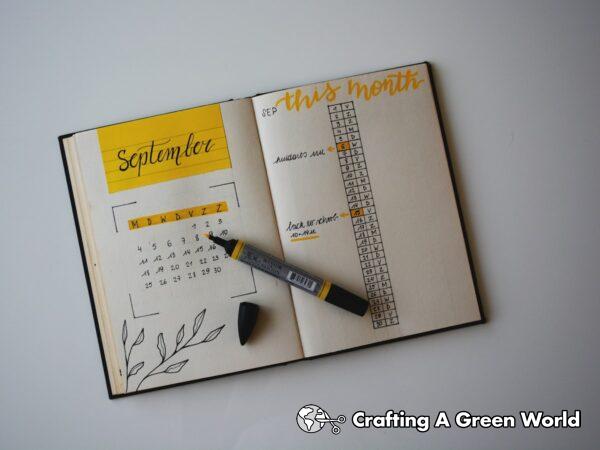Embracing the practice of mindful journaling can be a profoundly enriching tool for students. It aids not only in fostering creativity but also provides a sanctuary to articulate unexpressed thoughts, feelings and aspirations. In essence, it encourages a more mindful, introspective approach to life that can be truly transformative.
In this article, we will delve into a plethora of mindful journal prompts specifically catered towards students. Whether you’re desiring a deeper understanding of your emotions, seeking clarity on various aspects of your life, or simply yearning for the sheer joy of expressing yourself through writing, these prompts are designed to inspire and guide you.
So, grab your journal, choose a comfortable spot, and let’s embark on a journey of self-discovery and mindfulness together. 🤗
Benefits Of Mindful Journaling
Mindful journaling helps students articulate their thoughts, reduce stress, and improve focus, allowing them to achieve overall mental well-being and academic success. Here are 20 writing prompts that underscore the benefits of this practice:
- Describe a situation where you felt most at peace. How can you recreate that atmosphere for daily mindfulness?
- List three stressors you encountered today and brainstorm ways to tackle them mindfully.
- Reflect on a time when mindfulness helped you academically or socially. How did it change the situation?
- Write a letter to your future self about the benefits you hope to achieve from maintaining a mindful journal.
- Chronicle a normal day in your life from a mindful perspective. How does mindfulness change your perception?
- Describe a recent challenge you faced. How can mindfulness help in handling similar situations?
- List down five things that you are grateful for today.
- Write about the most calming place you know. How can visualizing this place aid your mindfulness?
- Recall a time when you experienced intense emotions. How could mindfulness have helped?
- Detail your perfect mindful morning routine.
- Write down your top three worries and a mindfulness technique you could use to lessen each one.
- Reflect on a situation where you were not fully present. How could mindfulness improve your focus next time?
- Observe your current environment and write about it in full detail, activating all senses.
- List down three ways you could incorporate mindfulness in your academic routine.
- Reflect on your dreams and ambitions. How can mindfulness positively impact your journey towards those goals?
- Write about a time when you felt most connected with nature. How do such experiences endorse mindfulness?
- Explain the effect of mindfulness on your relationship with family and friends.
- Detail any new insights you have gained from a recent mindfulness practice.
- Reflect on a negative thought you often have. Write down a positive, mindful counter for that thought.
- What is your favorite mindfulness quote and how does it inspire you?
Emotional Awareness Prompts
Emotional awareness prompts encourage introspection and understanding of personal emotions, encouraging students to acknowledge, express, and manage their feelings in a healthy and constructive way. Here are 20 prompts focused on developing emotional awareness:
- Detail an event that made you feel overwhelmingly happy. What specifically sparked that emotion?
- Write about a time when you felt scared or anxious. How did you face and overcome that fear?
- Describe an incident that made you feel angry. Why do you think you felt this way? Have your feelings changed over time?
- Catalog the emotions you have experienced in the past week. Can you identify their trigger points?
- List three situations where you felt surprised. What led to this surprise and what was your reaction?
- Reflect on an experience that caused you sadness. What could have changed to alter your emotional response?
- Write about a moment when you felt proud of your accomplishments. What led to this feeling of pride?
- Recount a scenario where you felt embarrassed. Has this experience informed your actions today?
- Explain a time when you felt envious or jealous of others. How did you manage these feelings?
- Discuss an instance where you felt extremely tired or stressed. How did you take care of your mental health in this situation?
- Identify a situation where you felt disappointed. What expectations had you set that weren't met?
- Share an experience where you were unsure of your feelings. How do you categorize it today?
- Detail a time when you had to control your emotions. Why was the restraint necessary and how did you manage it?
- Write about an event that elicited a strong emotional reaction. What made it so impactful?
- Discuss a moment you felt incredibly calm and content. How can you recreate similar moments in the future?
- Write about a challenging experience and how it helped you grow emotionally.
- Discuss how you manage conflicting emotions when faced with hard decisions.
- Reflect on a situation where you wish to have reacted differently. How can you change it moving forward?
- Recall a time when your emotions seemed out of control. What steps helped to bring them back in control?
- Lastly, write a letter to your future self, detailing the emotional growth and resilience you hope to see.
Promoting Positive Thinking
Promoting positive thinking through mindful journal prompts encourages students to harbor an optimistic outlook on life, nurturing resilience, happiness and personal development. Here are 20 writing prompts designed to stimulate a more positive mindset:
- List three things you're grateful for today and explain why.
- Describe a time when you were proud of yourself. How did that experience make you feel?
- What is one positive characteristic that you appreciate about yourself?
- Write a letter to your future self, detailing the achievements and happiness you envision.
- Reflect on a challenge you overcame. What did you learn from the situation?
- Describe your ideal day. What would make it perfect and why?
- Think about someone you admire. What qualities do they have that you would like to emulate?
- Write about a time you made a positive impact on someone else's life.
- List five things that bring you joy.
- Describe a happy memory and what it means to you.
- Write a positive affirmation to repeat to yourself throughout the week.
- Reflect on a recent achievement, no matter how small it may seem.
- How can you turn a negative situation into a positive one?
- What is one thing you are looking forward to in the future?
- Write about a time you felt strong and capable.
- List three ways you can improve your self-care routine.
- Describe an act of kindness you gave or received recently.
- Visualize a goal you hope to achieve. How does accomplishing this goal make you feel?
- Journal about a time you felt incredibly happy. What can you learn from this experience?
- Write a short message of encouragement to your future self for when times are tough.
Mindfulness And Relaxation Prompts
Mindfulness and Relaxation Prompts help students to build awareness of their emotions and surroundings, in order to improve their mental well-being and focus on the present. Here are 20 prompts to facilitate mindfulness and relaxation through journaling:
- Write about a moment today when you felt completely present.
- List five things in your environment you can see, four things you can touch, three things you can hear, two things you can smell, and one thing you can taste.
- Describe a situation that made you feel peaceful. How can you recreate that feeling when you are stressed?
- Record your feelings before and after a mindfulness or meditation session.
- Draw a picture of where you imagine to be while meditating or during relaxation.
- Write a detailed description about a favorite quiet place for relaxation.
- Reflect on the most relaxing part of your day today.
- Detail an imaginary encounter with a stressful situation and how you successfully navigated it.
- List three things you're grateful for today, and why.
- Reflect on how your body feels in this exact moment.
- Write a letter to your future self, reminding them about the importance of mindfulness and relaxation.
- Create a roadmap of your perfect, most relaxing day.
- Describe what mindfulness means to you in your own words.
- Jot down favorite mindfulness or relaxation quotes or affirmations.
- Express how a specific meditation or mindfulness practice made you feel.
- Write about a challenge you are facing and how mindfulness can help you overcome it.
- Craft a short story about a mindful journey.
- Describe a moment when you handled a situation mindfully rather than reactively.
- Prepare a list of activities that help you to relax when you're feeling anxious or stressed.
- Reflect on a person who embodies mindfulness and peace to you. Write about qualities you admire in them.
Building Self-esteem
Building Self-Esteem through mindful journaling helps students to foster a positive self-concept and a healthy perspective on their abilities and worth. Here are 20 writing prompts designed to aid in boosting self-esteem:
- Jot down five things you love about yourself.
- Reflect on a recent achievement and how it made you feel.
- Write about a time you faced a challenge head-on and prevailed.
- List three qualities that make you unique from others.
- Think about a mistake you made recently and how you learnt from it.
- Describe a situation where your resilience shone through.
- Imagine your life ten years from now. Draw a picture of what you hope to achieve.
- Write a letter of gratitude to yourself highlighting your strengths.
- Jot down a compliment someone recently gave you and why you think they said it.
- Describe a scenario where you successfully took a leadership role.
- Write about a fear you have overcome and how this bolstered your confidence.
- Reflect on a quality you possess that others often compliment.
- List three experiences that made you proud of yourself.
- Write about a habit you developed that positively impacts your self-esteem.
- Identify a personal trait you often diminish or overlook, and discuss why it's actually a strength.
- Compose a self-affirmation and explain what it means to you.
- Describe a situation where you were brave, detailing how it improved your self-confidence.
- Journal about how it feels when people recognize your efforts or achievements.
- Write about personal growth and positive changes you've noticed in yourself recently.
- Reflect on the kindest thing you've done for yourself lately and what it reflects about your self-esteem.
Gratitude Journalling
Gratitude Journaling focuses on applying mindfulness to the cultivation of appreciativeness, nurturing a positive outlook and resilience through the regular acknowledgement of things for which we are thankful. Here are 20 gratitude journal prompts for students:
- List five things that happened today you are thankful for.
- Write about someone who made a positive impact on your day. How did they make you feel?
- Recall a fantastic memory and jot down why you're grateful for that experience.
- What's an object in your possession that you're really thankful for? Why is it valuable to you?
- Identify three things about nature you are grateful for.
- Reflect on a challenge you recently overcame. What did you learn and why are you grateful for this experience?
- Write about someone who inspires you and why you're grateful for their presence in your life.
- List three aspects about your education/school for which you're thankful.
- Write about a negative experience you're grateful for because it helped you grow.
- What is one thing about your body that you are grateful for?
- Identify a book, movie, or song that has influenced your life positively.
- Narrate a time when a stranger's kindness made your day.
- List five things you see around you right now that you're grateful for.
- Reflect on a personal quality or skill you're thankful for.
- Name three people who have had a significant impact on your life and why you are grateful for them.
- Write about something that makes your life easier and why you appreciate it.
- How has a particular challenge or struggle made you a better person?
- Describe a happy family tradition you are grateful for.
- Write about an opportunity you've had that you are thankful for.
- Reflect on a moment of unexpected beauty or joy you have experienced recently. Why are you grateful for it?
Breath And Focus Prompts
Breath and Focus Prompts offer an intersection of mindfulness and writing whereby students channel their attention towards their breathing patterns, creating a calming mental state as a backdrop for introspection. Below are 20 prompts that direct mindfulness towards breath and focus:
- Describe how your body feels at this very moment as you breathe.
- Write about a time when focusing on your breath helped you through a stressful situation.
- List three adjectives to describe your breath today and explain why you chose them.
- Reflect on your breath rhythm. How does it change with your mood?
- Write down the thoughts that come up as you pause for a deep breath mid-sentence.
- Track your inhalation and exhalation for a minute. Describe the experience.
- Write a 'thank you' note to your breath for supporting and nourishing your life.
- Describe a place where your breath feels the most relaxed. What makes this place special?
- Create a poem or a short story using your breath sounds as your only source of inspiration.
- Contemplate and write about the relationship between your breath and your emotions.
- Describe your breath as if it were a character in a story. What journeys does it take?
- Write about a rhythm in nature that matches your breath. How does it make you feel?
- Reflect on how focusing on your breath can bring peace to your mind.
- Identify a moment in your day when you can incorporate focus on your breath.
- Write a reminder to yourself to take deep, centering breaths throughout your day.
- Describe the sensation of taking a significantly deep breath. How does it feel in various parts of your body?
- Write about how your breath changes during physical activity as opposed to rest.
- Reflect on the balance between focusing on your breath and letting your mind wander. How do these states impact your emotions?
- Write about how your breath feels at the start of the day compared to the end of the day.
- Contemplate how your life would change if you were more mindful of your breath daily.
Mindfulness In Learning
Practicing mindfulness in learning facilitates focused attention and awareness, promoting a more engaged and effective educational experience. Here are 20 mindful journal prompts to consider:
- Write about a time you were fully present during class. How did it affect your comprehension?
- Describe an instance where mindfulness would have enhanced your learning experience.
- Document a learning goal for the coming week and outline a mindful approach to achieve it.
- Record a situation where you were distracted while studying. How could mindfulness have helped?
- Reflect on your learning process with mindfulness techniques in mind. What changes can be made?
- Imagine a situation where you feel overwhelmed by schoolwork. How can mindfulness help restore balance?
- Write about a recent triumph, large or small. How did mindfulness play a role?
- Ponder over stressful education-related experience. How could mindfulness help alleviate that stress?
- Describe a scenario where mindfulness helped you retain information more effectively.
- Reflect on a conversation with a teacher or classmate. How did mindfulness influence your communication?
- Write about a situation where you struggled to understand a concept. How could mindfulness assist in such scenarios?
- In what ways can mindfulness improve your interactions with classmates or teachers?
- How would a mindful approach change the way you deal with academic challenges?
- Think about a time when a mindful approach helped improve your focus during a test or exam.
- Write about how mindfulness can act as a tool to manage time and schoolwork effectively.
- Reflect on simple actions you can take daily to engage in mindful learning.
- Describe how mindfulness can help in appreciating the process of learning, and not just the outcome.
- Write about how mindfulness have aided in your learning journey.
- Consider a teaching style that wouldn’t normally engage you. How can mindfulness change this?
- Look at your current study routine. How can mindfulness help optimize it?
Managing Stress And Anxiety
Utilizing mindful journal prompts enables students to understand and navigate their feelings of stress and anxiety in a beneficial and constructive manner. The below 20 prompts foster self-reflection and instill coping mechanisms for handling these emotions:
- Write about a situation that recently made you feel stressed, and how it impacted your day.
- Describe a moment where you successfully managed your anxiety. What techniques did you use?
- List five things you can do to destress when you're feeling overwhelmed.
- Write a letter to your stress and anxiety. What would you want to say?
- Reflect on a situation where you could have handled your stress or anxiety better. What would you do differently?
- Imagine your anxiety as a color. What color would it be and why?
- Write about a time you helped a friend or loved one navigate their stress or anxiety. How did you feel?
- List three physical activities that help you reduce stress and describe why they work for you.
- Write about a positive outcome that resulted from a situation that initially caused you stress or anxiety.
- Imagine a calm and peaceful place. Describe it in detail.
- Reflect on what your stress and anxiety are trying to teach you.
- List five things you are grateful for when you're feeling stressed or anxious.
- Describe a moment where you felt completely free of stress and anxiety.
- Write about an upcoming event that is causing you stress or anxiety. How can you prepare for it?
- List three relaxation techniques that help you manage your stress and anxiety.
- Write about your fear and how you can transform it into a source of strength.
- Reflect on your biggest stressor. What can you learn from it?
- Write down one thing that you'll do less of and one thing you'll do more of to reduce your stress levels.
- Describe a time when you turned your anxiety into motivation.
- Reflect on your progress in managing stress and anxiety. What are you proud of?
Promoting Inner Peace
Promoting Inner Peace through mindful journaling helps students find balance in their lives, nurturing personal growth and fostering a peaceful state of mind. Here are 20 journal prompts aimed at encouraging students to tap into their inner tranquility:
- Write about a situation where you felt the most peaceful. What makes this memory special?
- Think of three things you can do today to bring peace into your life.
- Describe an interaction that disrupted your inner peace. How would you handle it differently now?
- Create a list of five things that make you feel calm and content.
- Imagine your life five years from now where you achieve inner peace. What does it look like?
- Recount a time when you helped diffuse a conflict. How did it affect your sense of peace?
- What mantra or affirmations can you use to promote peace within yourself?
- Think about a problem you faced recently. Write about it from a more peaceful and understanding perspective.
- Write about a peaceful setting. Why does this setting help you find calmness?
- Think about a relaxing activity that brings you joy and peace. How does it make you feel?
- List the steps you can take to bring more tranquility into your daily routine.
- Describe a person who embodies peace in your opinion. What qualities do they possess?
- Write about a time when you forgave someone. How did it influence your inner peace?
- Reflect on a situation that made you angry recently. How can you let go of this anger?
- Record your own meditation or mindfulness practice for the day. How did it influence your state of mind?
- Write a thank-you note to yourself for maintaining calm during a challenging situation.
- Explore the small, everyday moments that bring you peace. Why do they have this effect?
- Write about something you are struggling to accept. How can inner peace help you with acceptance?
- Reflect on a situation where inner peace was hard to sustain. How do you plan to handle similar circumstances in the future?
- Imagine a peaceful day from start to finish. What does it look like and how does it make you feel?
Exploring Personal Aspirations
Exploring Personal Aspirations in mindful journaling invites students to contemplate and clarify their future goals, dreams, and life paths. Here are 20 journal prompts that can guide students in discovering and articulating their personal aspirations:
- Imagine your ideal future five years from now. What does it look like?
- Write about a goal you have for this school year.
- Describe your dream job or career. Why does it appeal to you?
- List three personal qualities or skills you want to develop.
- What is a dream vacation you would love to take? Why does it inspire you?
- Write about a personal success you're proud of.
- Describe a time you overcame a challenge. How did it shape your aspiration?
- Imagine you could learn any new skill or hobby. What would it be, and why?
- Write about a person you admire. What traits or achievements attract you to them?
- Describe a cause or issue you feel passionate about.
- Share a long-term goal you have. Why is this significant to you?
- Write about a book or movie that has influenced your dreams.
- What is the biggest obstacle that keeps you from achieving your aspirations?
- Craft a letter to your future self, highlighting the aspirations you hope to fulfill.
- What changes can you make in your daily life to get closer to your aspiration?
- Reflect on the ways your aspirations align with your values.
- Write about a failure that led to a better understanding of your dreams and goals.
- Imagine your life 10 years from now. What will you have accomplished?
- Describe a habit you aspire to cultivate that can help you reach your goal.
- At the end of your life, what accomplishment would you want to be remembered for?
Strengthening Motivation
Strengthening motivation with mindful journaling can inspire students to drive their own learning, boost their self-esteem, and challenge their boundaries. Here are 20 writing prompts that encourage motivation:
- Write down a big goal you have and the steps you believe are necessary to achieve it.
- Think of a time when you felt highly motivated. What sparked that feeling?
- List five things you've accomplished in the past week, no matter how small.
- What is one step you can take today towards your biggest goal?
- Reflect on a situation where you persevered despite challenges. What kept you going?
- Describe a situation where you lacked motivation and how you overcame it.
- What is a skill or subject you'd like to master? Write about why it interests you and steps you can take to learn more about it.
- Create a letter to your future self one year from now. What do you want to tell yourself?
- Consider a mistake you made recently. How can you use it as motivation to improve?
- Write about a person who inspires you. What qualities do they have that you admire?
- Jot down three things you're grateful for and how they can motivate your day.
- What is a habit that you'd like to develop? How can it benefit your life?
- Reflect on a rewarding experience in your life. What made it fulfilling?
- Where do you see yourself after graduating? Write down your vision in detail.
- Plan out your ideal day from morning till night. What activities would you include to stay motivated?
- Write a description of the person you want to be. How can you become this person?
- Think about your role model. What about their life or achievements motivates you?
- Contemplate an obstacle or fear you have. How can overcoming it make you stronger?
- Jot down affirmations that can help boost your motivation when you're feeling low.
- Write about the biggest lesson learned last month and how it has motivated you to change or grow.
Developing Empathy
Exploring empathy through the practice of mindful journaling provides students a deeper understanding of others' experiences and enhances their ability to connect with people around them. Here are 20 writing prompts that can help in developing empathy:
- Write about a time when you put yourself in someone else's shoes. How did it change your perspective?
- List five ways you can show empathy towards a friend who is going through a difficult time.
- Reflect on a time when someone showed empathy towards you. How did it affect your feelings and your situation?
- Write about a situation where you could have been more empathetic. What would you change if you could go back in time?
- Draw a picture of empathy and explain its symbolism and meaning to you.
- Ponder and write about a global issue, or a struggle faced by a group of people. How does it make you feel, and as a student, how can you contribute to a positive change?
- Write a letter to your future self. Describe a challenge you're currently facing and the feelings you're experiencing.
- Reflect on a book or movie that moved you. How did you empathize with the characters in the story?
- Describe a time when you helped someone, not out of duty, but out of empathy.
- Think of a person you have a hard time empathizing with. Write about what might be going on in their lives that you're unaware of.
- Narrate an instance where empathizing with someone made a significant difference in their lives.
- Describe a social issue from two different perspectives. What have you understood about both viewpoints?
- Write about a time when showing empathy brought you happiness.
- Imagine you are a leader. How would you use empathy to bring positive change in your community?
- Reflect on an emotional conversation you had with someone. How did showing empathy impact the conversation?
- Describe a character from a book or movie that you empathize with. Why do you feel this connection?
- Write about a personal challenge. How would you want someone to empathize with you about it?
- Describe the difference between empathy and sympathy based on your personal experiences.
- Choose an ordinary day and describe it from another person’s perspective.
- Write about a time when, despite different beliefs or opinions, you felt empathy toward someone. How did it affect your relationship with that person?
Student Life Reflections
Student Life Reflections involve encouraging students to delve deeper into their personal experiences, feelings, and attitudes toward their academic journey, providing them with an introspective view of their growth and learning. Here are 20 mindful journal prompts to explore:
- In what ways have you grown since the school year began?
- Write about a recent challenge you faced in your academic journey and how you overcame it.
- Reflect on one of your favorite classes this year. Why is it your favorite?
- Have you made any new friends this semester? Describe the experience.
- Write about a moment when you felt proud of a grade or accomplishment.
- Detail a tough decision you had to make this year. What was the decision, and how do you feel about the choice you made?
- Think about a time when you failed or made a mistake. What did that experience teach you?
- Describe a situation where you stepped out of your comfort zone. How did it make you feel?
- What study habits have you developed this year? Have they been effective?
- Write about a stressful situation you experienced. How did you manage it?
- Reflect on a fun or inspirational extracurricular activity you participated in. How has it impacted you?
- Have you recently received constructive criticism? How did it help you grow?
- Describe an encounter with a teacher or a mentor that has made an impact on you.
- How do you balance schoolwork, social life, and personal well-being?
- Write about a time you helped a classmate or friend in need.
- Think back to the last group project you worked on. What role did you play, and what did you learn?
- Draw a connection between a subject you're studying and your life outside school.
- Recollect an event or a moment that made you really appreciate being a student.
- Write about your school or college community. How do you feel toward it?
- Lastly, ask yourself: In what ways can you improve before the school year ends?
Dealing With Peer Pressure
Understanding the nuances of peer pressure while through journaling is an effective way for students to develop resilience and self-confidence, cultivating a mindful understanding of personal values and boundaries. Below are 20 prompts to address this topic:
- Write about a moment when you really felt the pressure to conform. How did you respond?
- Think of a time when you stood up to peer pressure. How did it influence your sense of self?
- Describe an experience where you succumbed to peer pressure. What were the consequences?
- Reflect on a scenario where you were the one applying peer pressure. Why did you do it?
- List three strategies you could use in the future to effectively deal with peer pressure.
- Think of a person you admire who maintains their values despite pressures. What can you learn from them?
- Imagine you were advising a younger sibling or friend about peer pressure. What would you tell them?
- Write a letter to your future self about how you feel when you go against the crowd.
- Describe any changes you’ve made to ensure you make decisions true to yourself, not because of peer pressure.
- Examine the role of social media in peer pressure. How does it impact you?
- Detail an experience where you regret giving in to peer pressure. How can you prevent it in future?
- Go back to a moment when you felt proud for not giving into the pressure. What made you stick to your decision?
- Write about the fear associated with peer pressure. How does it manifest for you?
- Describe how your understanding of peer pressure has evolved over the years.
- Recall a situation where peer pressure led to positive outcomes. What happened?
- Identify any patterns associated with feelings of peer pressure in your life. What triggers them?
- Ponder a time when your decision to not give into peer pressure positively impacted someone else.
- Write a short story about a fictional character dealing with peer pressure. What choices do they make?
- List the people in your life who support you when you're dealing with peer pressure.
- Write an affirmation for yourself to refer to during times of peer pressure. What do you need to remember?
Cultivating Patience And Tolerance
Cultivating patience and tolerance through mindful journaling allows us to navigate our emotions purposefully, fostering a deeper understanding and acceptance of ourselves and others. Here are 20 mindfulness prompts geared toward enhancing your patience and tolerance:
- Reflect on a time when you demonstrated patience. What led to this?
- Write about an instance where you could have been more tolerant. What could you have done differently?
- Describe a moment when someone showed patience towards you. How did it make you feel?
- List three ways you can practice patience today.
- Think about someone you find it challenging to tolerate. Write about the positives they may bring to your life.
- What is one thing that always tests your patience? Why do you think this is?
- Write about a time when you showed tolerance toward a person with a very different viewpoint.
- Think of a situation where patience brings you a better outcome. Write about its potential benefits.
- List three different situations or people that challenge your tolerance. Think about how you can understand them more deeply.
- Reflect on an instance when exercising patience resulted in a better understanding or resolving of a situation.
- Describe a situation where your tolerance was tested and you succeeded in remaining calm and understanding.
- Write down three affirmations to promote patience and tolerance within yourself.
- Think of how tolerance of different people and viewpoints can lead to personal growth. Write about it.
- Reflect on a recent event where you lost your patience. Laid out the steps that could be taken to alter your reaction.
- List down the things that test your patience the most. For each item, write a coping mechanism.
- Write about methods to reinforce tolerance when confronted with differing opinions.
- Reflect on an instance where lack of patience led to a negative outcome. How would patience have changed it?
- Think about someone who exemplifies tolerance, describe their qualities that you would like to adapt.
- Write a letter to future self reminding about the importance of patience and tolerance in difficult situations.
- Reflect on the progress you have made in cultivating patience and tolerance through these mindfulness journaling exercises.
Prompts For Emotional Resilience
Promoting emotional resilience through mindful journaling equips students with the coping mechanisms to face adversities and manage their feelings bravely. Here are twenty writing prompts aimed at building emotional resilience:
- Reflect on a challenge you faced recently, and how you overcame it.
- Write about an experience where you showed courage in the face of adversity.
- Describe a situation you initially thought as negative, but turned out to have positive implications.
- List three things you learned from a disappointment you recently encountered.
- Think about a time where you demonstrated patience despite difficult circumstances.
- Write about a situation where you found strength in vulnerability.
- Detail a time you didn’t reach a goal and how you responded to that.
- Explore how a significant setback helped you grow as an individual.
- Write about something you're fearful of, and how you could tackle this fear.
- Describe how you currently cope with stress and how effective you think these methods are.
- Reflect on your biggest personal growth over the last year.
- Write about a time you stood up for what you believed in.
- Detail how you handle criticism and what improvements could be made to this approach.
- Think of an instance where you showed strong perseverance, despite having the option to give up.
- Write about a difficult decision you had to make recently and how it affected you.
- Describe an event you experienced that felt unfair at the time, but now you see it from a different perspective.
- Reflect on a challenge you anticipate facing soon, and how you plan to handle it.
- Write about emotions that are tough for you to express, and why.
- Think about a time when your self-belief helped you through a challenging situation.
- Reflect on an experience that has significantly shaped your outlook on resilience.
Balancing School And Personal Life
Balancing school and personal life through mindful journaling encourages you to prioritize and manage your tasks and downtime effectively, promoting personal growth alongside academic success. Here are 20 thoughtful writing prompts to help you maintain this equilibrium:
- Write about the most challenging part of juggling school work and personal time.
- Recall a day when you were able to balance school and personal life perfectly. What did you do differently?
- List three school tasks and three personal tasks you enjoy and find meaningful.
- Identify one school-related task that you procrastinate on. Why do you think this is?
- Reflect on a time when your personal life took a back seat due to school. How did it make you feel?
- Discuss your ideal daily routine. How does it differ from your current routine?
- Express what being 'overwhelmed' means to you.
- Contemplate an activity you can do daily to promote balance in your life.
- Describe a moment when you took time for yourself amidst a busy academic schedule.
- Consider a boundary you can introduce to separate school and personal time.
- Imagine your life in a month if you continue your current balance of school and personal life. How would it turn out?
- List the ways you could weave relaxation into your study time.
- Choose a hobby turned obligation. Write about how this transition happened.
- Explore a lesson you learned from times when your life was imbalanced.
- Picture a place where you feel at peace and balanced. What does it look like?
- Grapple with a fear that prevents you from making time for personal activities.
- Identify a school responsibility you feel is taking too much of your personal time.
- Journal about a non-academic achievement that made you proud.
- Mull over the way you manage your time. Is there room for improvement?
- Write a pledge promising yourself to strive for a better balance between school and personal life.
Understanding Feelings And Emotions
Digging deeper into understanding feelings and emotions through mindfulness journaling can guide us in untangling our thoughts, ultimately fostering emotional intelligence and self-awareness. Here are 20 prompts to encourage exploration of feelings and emotions.
- Write about a moment you felt extremely happy. What triggered this feeling?
- Describe a situation where you experienced anger. How would you handle it differently today?
- Recall an instance in which you felt anxious. What could have alleviated your anxieties?
- Describe a time you felt proud. What accomplishment led to this feeling?
- Convey an instance where you felt confused. What would have made the situation clearer?
- Visualize an exciting moment. Share why it made you excited.
- Decipher a moment of frustration. Would changing your perspective help the situation?
- Write about a moment when you felt shame. How would self-forgiveness look in this situation?
- Recount an experience of fear. How would courage have changed the circumstance?
- Put into words a time when you felt secure. What contributed to this feeling of safety?
- Detail a situation of surprise. What elements were unexpected?
- Reflect on a moment when you felt disappointed. What expectations did you have?
- Chronicle an experience of joy. How could you recreate that atmosphere?
- Think about an instance when you felt embarrassed. How can you release these feelings of discomfort?
- Document a moment when you felt calm. What cultivated this serenity?
- Recall a time you felt lonely. How would reaching out to someone have helped?
- Reveal a moment when you felt inspired. What sparked your inspiration?
- Portray an instance of guilt. How can you make amends?
- Narrate an experience when you felt loved. What did love look like in that moment?
- Write about a moment when you felt relaxed. How can you create similar conditions in the future?
Improving Concentration And Focus
Improving concentration and focus through mindful journaling enables students to enhance their productivity, improve their retention of new information, and handle stress more effectively. Here are 20 prompts that can guide you in improving your focus and concentration:
- Write about a time you were completely focused on a task. What helped you stay focused?
- Describe a project that requires your full concentration. How would you benefit from maintaining focus on this task?
- Reflect on an occasion where your lack of focus affected your performance. What could you have done differently?
- List three strategies you will use today to improve your focus and concentration.
- Create a letter to your future self describing how improved focus and concentration has positively impacted your life.
- Record a challenging task that you completed recently. How did maintaining your concentration contribute to your success?
- Think about a time when your concentration was disrupted. How do you plan to prevent this in the future?
- What are some obstacles that commonly disrupt your focus? How can you overcome these?
- Plan a focus-enhancing daily routine and describe what each step of your plan looks like.
- Write about a habit you'd like to develop to improve your concentration.
- Reflect on a moment you successfully overcame distractions. What strategies did you implement?
- Describe three things you appreciate about your ability to focus.
- What does a productive, focus-filled day look like to you?
- Identify five distractions in your learning environment and brainstorm ways to eliminate or reduce them.
- Write an encouraging letter to yourself for a future moment when maintaining focus feels challenging.
- How does your ability to concentrate affect your overall mood?
- List the tasks you find most challenging to focus on and strategies to improve your concentration while executing them.
- Explore how certain activities, like mindful breathing or exercise, can enhance your ability to focus.
- Reflect on how improved focus and concentration can help achieve your academic goals.
- Finally, identify ways you can reinforce and reward yourself for maintaining concentration.
Exploring Future Potential
Delving into your future potential through mindful journaling invites self-awareness and exploration, creating an opportunity for students to unlock their full capabilities and plan forward. Here are 20 prompts geared towards discovering more about your future potential:
- When you think about your future, what are the first three words that come to your mind and why?
- Describe three career choices that interest you, and why you are drawn to them.
- What do you hope to have accomplished 5 years from now?
- Identify three skills or talents you would like to develop or improve. Why are these important for your future?
- Write about your biggest goal and outline the steps you need to achieve it.
- Visualize your ideal life ten years from now. What does it look like?
- Think about a role model in your life. What qualities do they possess that you would like to develop?
- What fears or challenges could prevent you from reaching your future goals? How could you overcome them?
- Write a letter to your future self. What advice or encouragement would you like to give?
- If failures were not a concern, what would you like to achieve?
- Describe a significant life event that shaped your perspective about the future.
- Identify any habits or routines you think could benefit your future self.
- If you were to mentor someone, what lessons from your life experience would you want to share?
- What learning opportunities could you explore further to help shape your career or education path?
- Write about a moment when you felt proud of yourself. How can this experience inspire your future actions?
- Describe an area in your personal development you'd like to focus on. How will this help you in the future?
- If you could change one thing in your life right now that could positively impact your future, what would it be?
- What does success look like for you? List the steps you think you need to take to achieve it.
- Identify a cause or issue that you feel passionate about. How could you contribute to it in the future?
- Write about a book or movie character that resonates with your ideal future self. What qualities do they possess that you admire?
Accepting And Embracing Change
In mindful journaling, accepting and embracing change helps students adapt to new circumstances, grow as individuals, and develop resilience. Here are 20 journal prompts to help you better understand and accept changes in your life:
- Describe a recent change in your life. How did it make you feel, and why?
- Reflect on a time when you successfully adapted to change. What strategies did you use?
- Write about a change you're currently resisting. What are the hurdles you're facing?
- List three positive aspects of a recent significant change in your life.
- Consider a change that initially seemed negative, but turned out positively. What lessons did you learn?
- Draft a letter to your future self, detailing how you overcame a specific change.
- Write about a time when you had to change your viewpoint on an important issue.
- Envision yourself 10 years from now. What changes do you anticipate, and how do you feel about them?
- Reflect on a personal weakness you'd like to change. How could you start working on it?
- Imagine a world where nothing ever changes. How would you feel living in this world?
- Describe a change in your life that you found extremely stressful. How did you cope?
- Write a short story that involves a major life change. How does the protagonist handle it?
- Think about a habit you changed recently. How has it affected your life?
- Reflect on a change you wish you had handled differently. What would you do differently next time?
- List five changes you look forward to in the near future.
- Write about a change that challenged your belief system. How did you reconcile your views?
- Describe a change you would want to make in your school or community. Why is this change important to you?
- Think about a change that brought out a strength you didn’t know you had.
- Write a poem about the beauty and inevitability of change.
- Reflect on how you've changed over the past year. What positive outcomes have come from it?
Self-affirmation Prompts
Self-Affirmation Prompts facilitate students in expressing and reinforcing positive beliefs about themselves, elevating their understanding of their personal strengths, values, and potential. Here are 20 self-affirmation prompts to boost self-esteem and promote positive thinking:
- Jot down three things that you like about your personality.
- Describe an achievement that made you proud of yourself.
- List five strengths that define you as an individual.
- Reflect on a challenge you overcame successfully. How did that improve your self-belief?
- Write about a talent or skill that you appreciate in yourself.
- Think about a recent compliment you received. How did it make you feel?
- Express gratitude for three personal qualities that set you apart.
- Detail an instance when you made a difference in someone's life.
- Write about a moment you felt genuinely happy and content with who you are.
- Reflect on how you have grown as a person over the past year.
- List three things you would say to motivate yourself when you're feeling low.
- Describe a goal that you're working towards because it aligns with your values.
- Acknowledge a mistake you made, and how you learned from it.
- Jot down the attributes that you believe make you a good friend or student.
- Write about an obstacle you are facing, and affirm that you have the strength to overcome it.
- Think about a situation where you stood up for what you believed in.
- Express appreciation for a unique trait that only you possess.
- Reflect on what you love most about your physical appearance.
- Write a letter to your future self, detailing all the accomplishments you're proud of today.
- List three positive affirmations that you would want to start your day with.
Prompts About Mindfulness And Relationships
The concept of Mindfulness and Relationships centers on promoting awareness and understanding of our interactions and connections with others. Here are 20 prompts to inspire this exploration:
- Record an instance when you experienced deep connection with someone. What factors contributed to this?
- Recall a time someone showed you kindness when you were needy. How can you pay it forward?
- Describe how you currently manage conflict. Could there be a more mindful approach?
- Reflect on the most cherished trait of a loved one. How has it influenced you?
- List three ways your classmates have positively affected your life.
- Describe a moment when you were empathetic to a friend's situation. What did you learn from it?
- Write about a time you had to exercise patience in a relationship. What was the outcome?
- Record an interaction with someone where you were fully present. How did that feel?
- Consider a time when you've forgiven someone. What led you to it?
- Reflect on a moment where you had to seek forgiveness. How did that experience shape you?
- Outline a scenario where listening attentively made a big difference.
- Recall a miscommunication you had with someone. How could mindfulness have changed the outcome?
- Describe any changes you've noticed in your close relationships since practicing mindfulness.
- List three ways practicing mindfulness has improved your communication with others.
- Reflect on a tense social setting you were part of. How did mindfulness help you cope?
- Journal about the feelings when someone close misunderstood your intentions. Could mindfulness have made a difference?
- Write about a moment when you were appreciative of someone's presence. What made that moment special?
- Reflect on a time you consoled someone in distress. What mindfulness practices helped you offer comfort?
- Document a situation where understanding someone else’s perspective improved your relationship with them.
- Write down one step you will take this week to improve a strained relationship mindfully.











